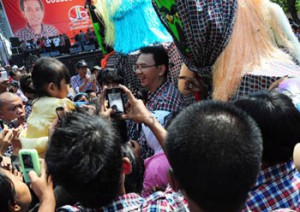 Ahok.Org – When mob violence swept across the Indonesian capital in May 1998, Basuki Tjahaja Purnama, an ethnic Chinese geologist and businessman, joined terrified neighbors in the heavily Chinese district of Pluit to defend their lives and property. They used sticks, gasoline bombs and even a few old shotguns to fend off attackers drunk with anti-Chinese fury.
Ahok.Org – When mob violence swept across the Indonesian capital in May 1998, Basuki Tjahaja Purnama, an ethnic Chinese geologist and businessman, joined terrified neighbors in the heavily Chinese district of Pluit to defend their lives and property. They used sticks, gasoline bombs and even a few old shotguns to fend off attackers drunk with anti-Chinese fury.
The frenzy of looting, rape and murder — triggered by a deep economic crisis and a vicious struggle for political power — stirred comparisons to Nazi assaults against the Jews. It so traumatized Indonesians of Chinese descent that many fled abroad, despairing at the seemingly ineradicable racism of their home country.
Basuki, urged by friends and relatives to flee, decided to take a gamble and stay, judging that “the people who should leave are the rioters, not us. This is my country. Why should I leave?”
Since then government bureaucrats have destroyed Basuki’s mining business, and, as a Christian, he has endured taunts that Indonesia, the world’s most populous Muslim nation, doesn’t need “infidel” interlopers.
Yet, Basuki has done something that not long ago seemed impossible: He has become a successful politician, confounding predictions that Indonesian voters, who are mostly Muslims of indigenous blood, would never support an ethnic Chinese Christian, a member of a small and vulnerable minority that plays a major role in Indonesian business and in many professions.
Basuki, who first entered politics in his home region of Belitung, an island in the Java Sea, and is trying to repeat his success in Jakarta, thinks Indonesia is moving toward an “Obama moment” — a rupture with a long and often violent history of prejudice and resentment.
Indonesia, a vast and sprawling archipelago, boasts extraordinary and potentially explosive ethnic and linguistic diversity. Its population of about 240 million comprises more than 1,000 ethnic groups and subgroups, the biggest of which is Javanese. Nearly all are classified as “pribumi,” or “sons of the soil,” a term coined during Dutch colonial rule to designate “native Indonesians.”
Chinese Indonesians, despite roots in Indonesia that stretch back centuries, have often been regarded as alien intruders by this overwhelming pribumi majority. A 2000 census, the last such comprehensive survey, put the number of ethnic Chinese in Indonesia at just 1.7 million — about 0.9 percent of the population — but the census asked people to identify their ethnic group, something that many Chinese would have been reluctant to do. Their real number is thought to be several times as high. About a third of Indonesia’s ethnic Chinese are reported to be Christian.
Challenging the norms
On a trip to the United States in 2008, Basuki visited Denver during the Democratic National Convention and marveled at the nomination of Barack Obama, the son of a Kenyan who spent part of his boyhood in Jakarta, for president. Indonesia, Basuki said, has been breaking down old barriers, too, and will one day elect a leader from a minority. [washingtonpost.com]
Link Berita BTP Lainnya di Washingtonpost Link Pertama dan Kedua





kurang 2 page.
page 2 : http://www.washingtonpost.com/world/asia_pacific/in-indonesia-ethnic-chinese-see-a-new-future/2012/08/18/4befc374-e870-11e1-9739-eef99c5fb285_story_1.html
page3 :http://www.washingtonpost.com/world/asia_pacific/in-indonesia-ethnic-chinese-see-a-new-future/2012/08/18/4befc374-e870-11e1-9739-eef99c5fb285_story_2.html
“… will one day elect a leader from a minority.”
just don’t like the word of MINORITY, sounds so negative 🙂
But, indeed, you’re born here, you grown up here, so you shouldn’t leave Indonesa. Can’t wait to see your work hard for better and NEW JAKARTA soonest!